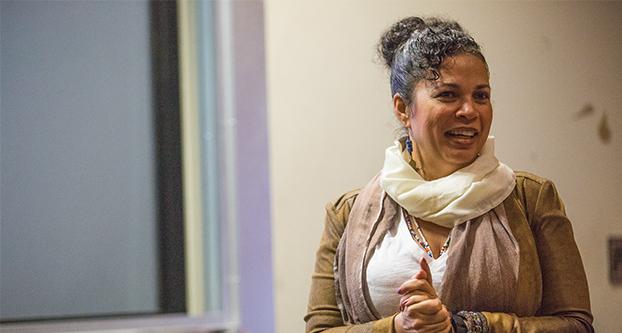A Black Lives Matter organizer and Los Angeles professor examined sexism within the Black community during a speech on Feb. 17, helping students find ways to equality.
The Cross Cultural and Gender Center’s African-American and Gender Programs and Services welcomed Dr. Malina Abdullah to Fresno State to give a talk titled, “Sexism in the Black Community.”
Abdullah, a professor of pan-African studies at California State University, Los Angeles, focused her talk around the historic stem of sexism in the black community and how it further manifested into the issues seen in the present.
In her research, Abdullah discovered the societal structures of pre-colonial Africa were non-hierarchical. Men traditionally hunted because women often were with child or nursing. The absence of the men placed women as the power holders to make and enforce rules.
Abdullah said most people view the making and enforcing of rules as the essence of power.
“What was acknowledged in those societies is it’s not more valuable to make and enforce rules than it is to hunt,” Abdullah said. “We need both of those things.”
Abdullah credited civil rights activist Angela Davis for pinpointing post-emancipation as the beginning of the demise of equality between black men and black women in their efforts to attain freedom.
The scholar spoke of the attempt to position black men on an equal playing field as white men, whom she identified as the most free in society.
“It’s important that we understand this is something foreign to who we are as black people,” Abdullah said. “It doesn’t mean it’s not a part of the black community now, but it comes from somewhere else rather than being indigenous.”
Abdullah stressed that the way to freedom for women in the black community is by disputing white patriarchy.
“We’re taught to kind of subsume our interest to allow black men to really be agents of white patriarchy, and we have to resist that,” she said.
For Abdullah, women shouldn’t be afraid of challenging patriarchy.
“It means lovingly challenging it, and sometimes vigorously challenging it, but always challenging it,” she said.
The scholar suggested the “liberation” of women in the black community will lead to freedom of its men.
“We often raise our boys with very narrow definitions of what manhood is, what boyhood is. This idea that you can’t be sensitive, you can’t be affectionate,” Abdullah said. “This notion that your manhood and your power comes from the oppression of women.”
Following the talk, Abdullah encouraged open discussion between audience members. Students like Crea Jackson, a junior majoring in public relations and the lead student coordinator for African-American programs and services, were able to ask questions and share personal experiences.
“[The talk] made me feel really empowered as a black woman and also more knowledgeable,” Jackson said. “I’m inspired to do more work, to challenge myself to speak more on certain issues and to challenge others within our community.”
Jackson said she plans to go forward with advocating for gender equality by avoiding bringing men into the conversation.
“So I think for me [I’ll go forward] being more intentional about our space and not always having to include everyone else in our space. Kind of focusing on ourselves, then uplifting each other and how we can be stronger women,” she said.
For Cira Armstead, a senior majoring in public health administration and a member of Black Students United and African Black Correlation, the key to equality comes from education.
“One of the students said it best,” Armstead said. “With teaching each other and understanding one another in order to form a better union to move forward.”





